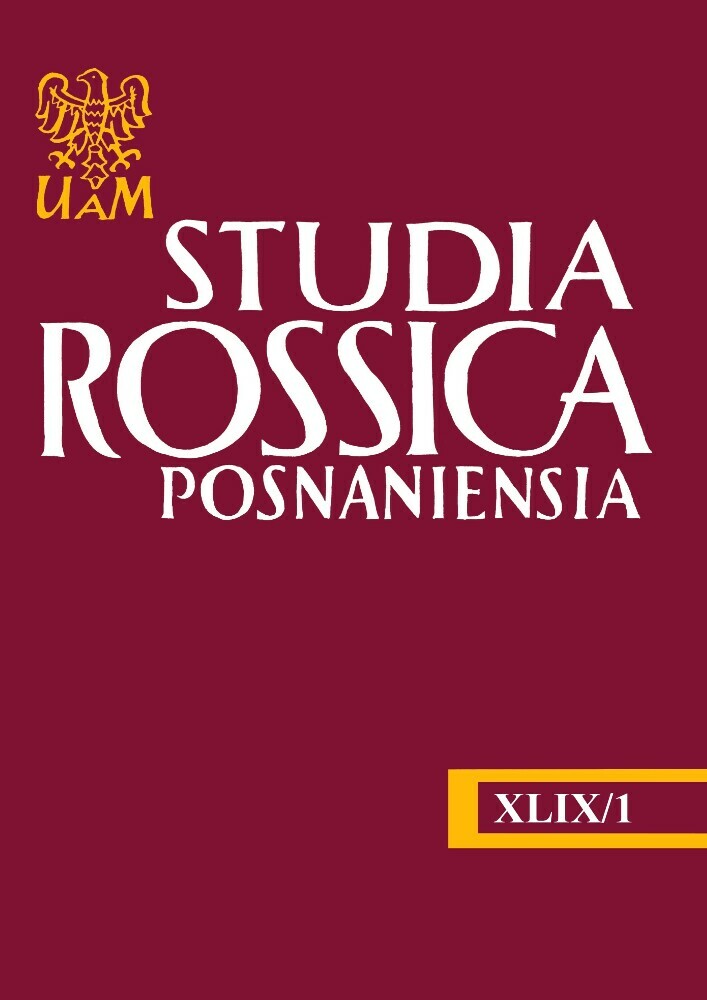Abstrakt
The problem of interpreting local history is relevant to St. Petersburg, as to many other major historical cities. This article examines phenomena united by the concepts of local (spatial) myth and urban narrative, which go beyond official discourse. Alternative images of the city, based on its concealed places of interest contrast with one of the most widespread representations of St. Petersburg – its association with the heritage of imperial culture. The selection of memorable places and stories shifts from recognizable city landmarks to other objects that reveal the history and image of particular St. Petersburg sites, people’s daily lives and peripheral issues of urban life. This approach to the exploration of urban space, a phenomenon called New Local History, is presented and explained in the article as the rediscovery of the historical potential of the city. The examples given in the article also show the possible role of New Local History in encouraging residents to develop an interest in their own history, in the problems of modernity and in participating in socially significant projects. Trends in interaction with urban space and memory practices that offer alternative interpretations of the past have been identified in various socio-cultural initiatives. In the context of Russian memory politics, this approach often becomes oppositional.
Bibliografia
Anciferov, Nikolaj. „Peterburg Dostoevskogo (Opyt literaturnoj èkskursii)”. Èkskursionnoe delo, 2, 1921, s. 1–20.
Baryšnikov, Vladimir, Boris Zaostrovcev, Aleksandr Filûškin. „Imperiâ, pamâtʹ i «Mesta pamâti»”. Vestnik Sankt-Peterburgskogo universiteta. Istoriâ, 3, 2011, s. 84–89.
Epple, Nikolaj. Neudobnoe prošloe. Pamâtʹ o gosudarstvennyh prestupleniâh v Rossii i drugih stranah. Moskva, NLO, 2020.
Filûškin, Aleksandr. „Ot istoričeskogo kraevedeniâ k Novoj lokalʹnoj istorii”. Aleksandr Filûškin et al. Teoriâ i metodologiâ istorii. Moskva, Ûrajt, 2021, s. 227–233.
Galkina, Ûliâ. „Progulka po obʺektu ÛNESKO – Biostancii Pavlova pod Peterburgom”. The Village. Gorodskoj internet-sajt. 23.07.2021. Web. 10.11.2022. https://www.the-village.ru/city/route/biostation.
Galkina, Ûliâ, Maksim Kosʹmin, Anton Akimov. Istorii domov Peterburga, rasskazannye ih žitelâmi. Moskva, Èksmo, Bombora, 2020.
Gorgadze, Aleksei, Valery Gordin, Natalia Belyakova. „Semantic analysis of the imperial topic: Case of St. Petersburg”. E-Review of Tourism Research, 16/2–3, 2019, s. 3–13.
Grevs, Ivan. „Monumentalʹnyj gorod i istoričeskie èkskursii (Osnovnaâ idea obrazovatelʹnyh putešestvij po krupnym centram kulʹtury)”. Ivan Mihajlovič Grevs i peterburgskoe kraevedenie: Sbornik k 150-letiû so dnâ roždeniâ. T. 1. Red. Boris Kaganovič, Aleksandr Kobak. Sankt-Peterburg, Evropejskij dom, 2010, s. 19–44.
Jenkins, Henry et al. Confronting the challenges of participatory culture: Media education for the 21st century. Cambridge, MIT Press, 2006. DOI: https://doi.org/10.18261/ISSN1891-943X-2007-02-04
Johnson, Emily. How St. Petersburg learned to study itself: The Russian idea of kraevedenie. University Park, Penn State University Press, 2006. DOI: https://doi.org/10.1515/9780271030371
Kelly, Сatriona. Remembering St. Petersburg. Web. 20.04.2023. www.academia.edu/6847211/REMEMBERING_ST_PETERSBURG.
Knâginin, Vladimir et al. Novaâ kulʹturnaâ geografiâ Sankt-Peterburga. Sovremennoe iskusstvo. Vystavki. Obrazovatelʹnye i prosvetitelʹskie proekty. Aktualʹnaâ kulʹtura. Èkspertno-analitičeskij doklad. Sankt-Peterburg, Fond podderžki innovacij i molodežnyh iniciativ Sankt-Peterburga, 2021.
Konečnyj, Alʹbin. „K istorii gumanitarnogo otdela Petrogradskogo naučno-issledovatelʹskogo èkskursionnogo instituta (1921–1924)”. Ètnografiâ Peterburga–Leningrada: materialy ežegodnyh naučnyh čtenij, 3. Red. Natalʹiâ Ûhneva. Sankt-Peterburg, 1994, s. 50–58.
Kožanov, Kirill. „Sovremennye funkcii gorodskoj èkskursii: kulʹturologičeskij aspekt”. Âroslavskij pedagogičeskij vestnik, 3 (108), 2019, s. 204–209.
Kraeva, Larisa. „Kraevedenie online: istoriâ odnogo mikrorajona v socialʹnoj seti”. Kulʹtura i tehnologii, 6/1, 2021, s. 15–21.
Kubrâkova, Ekaterina. Golosa iz okon: Oživšie istorii peterburgskih domov. Moskva, Bombora, 2023.
Loskutova, Marina. „How St. Petersburg learned to study itself: The Russian idea of Kraevedenie by Emily Johnson (review)”. Ab Imperio, 1, 2007, s. 495–504. DOI: https://doi.org/10.1353/imp.2007.0072
Lurʹe, Lev. „«Novoe Kraevedenie». Lekciâ Lʹva Lurʹe 10.10.2013. Anons”. Zovëm.ru. Web. 30.10.2022. http://zovem.ru/event/novoe-kraevedenie-lektsiya-lva-lure-38412.
Moroz, Oksana. „Sovremennye media kak svidetelʹ: rossijskij opyt (samo)opisaniâ soobŝestva”. Šagi / Steps, 3, 2015, s. 139–153.
Novikova, Lidiâ, Ekaterina Trubina. „Kraevedčeskie periodičeskie izdaniâ Rossijskoj Federacii na rubeže vekov: puti i osobennosti razvitiâ”. Bibliosfera, 2, 2011, s. 59–66.
Paharev, Nikita. „Menâ privlekaet obšarpannostʹ goroda… Intervʹû s N. Nanevoj”. Bumaga, 18.02.2021. Web. 21.04.2023. https://paperpaper.io/menya-privlekaet-obsharpannost-goro/.
Razdorskij, Aleksej, red. Kraevedčeskaâ periodika Rossii 1992–2010: materialy k bibliografii kraevedčeskih periodičeskih i prodolžaûŝihsâ izdanij Rossijskoj Federacii. Sankt-Peterburg, Evropejskij dom, 2010.
Smirnova, Aleksandra. „Iz istorii otečestvennoj èkskursionnoj školy: Petrogradskij (Leningradskij) èkskursionnyj institut (1921–1924 gg.)”. Vestnik RGGU. Seriâ: Literaturovedenie. Âzykoznanie. Kulʹturologiâ, 6 (86), 2012, s. 58–77.
Stepanov, Boris. „My pereživaem vsplesk massovogo interesa k kraevedeniû, v tom čisle u raznyh molodežnyh grupp…”. Intervʹû s N. Antropovoj. Realʹnoe vremâ, 20.10.2019. Web. 20.04.2023. www.realnoevremya.ru/articles/155313-boris-stepanov-o-fenomene-rossiyskogo-kraevedeniya.
Stites, Richard. „Cultural capital and cultural heritage: St. Petersburg and the arts of imperial Russia”. Preserving Petersburg: history, memory, nostalgia. Eds. Helena Goscilo, Stephen M. Norris. Bloomington, Indiana University Press, 2008, s. 182–196. DOI: https://doi.org/10.2307/j.ctt2005v40.12
Šer, Maksim. „Gavanʹ i Čekuši. Progulka po portovo-promyšlennym rajonam Peterburga”. Zapovednik, 20.11.2020. Web. 18.12.2023. https://zapovednik.space/material/gavan-ichekushi.
Toporov, Vladimir. „Peterburg i Peterburgskij tekst russkoj literatury”. Mif. Ritual. Simvol. Obraz. Moskva, Progress-Kulʹtura, 1995, s. 10–56.
Troickaâ, Anna. „Lokalizaciâ iskusstva kak sposob pereformatirovaniâ gorodskogo prostranstva”. Neprikosnovennyj zapas. Debaty o politike i kulʹture, 1 (123), 2019, s. 115–122.
Zamâtin, Dmitrij. „Gumanitarnaâ geografiâ: prostranstvo, voobraženie i vzaimodejstvie gumanitarnyh nauk”. Sociologičeskoe obozrenie, 9/3, 2010, s. 26–50.
Licencja
Prawa autorskie (c) 2024 Anna Troitskaya

Utwór dostępny jest na licencji Creative Commons Uznanie autorstwa – Użycie niekomercyjne – Na tych samych warunkach 4.0 Międzynarodowe.

